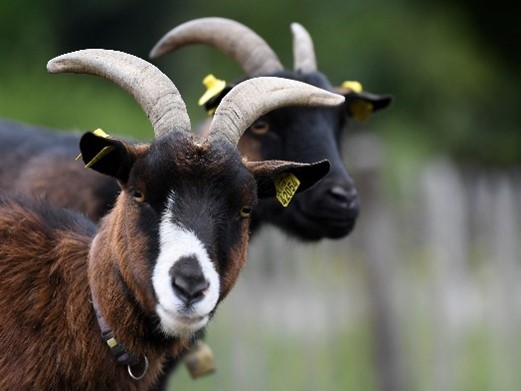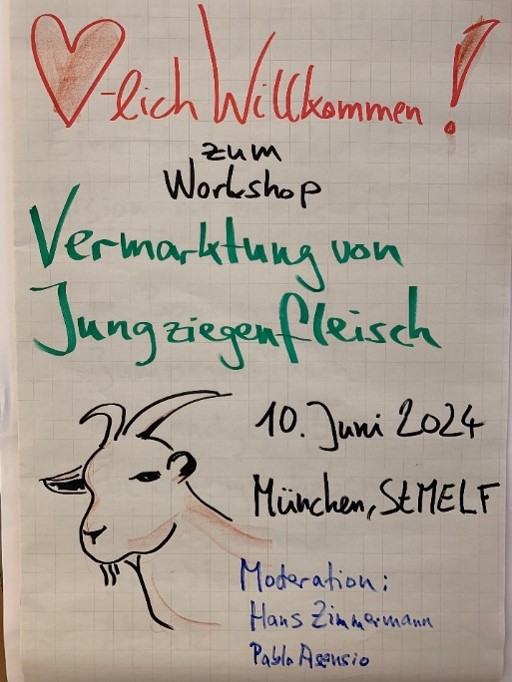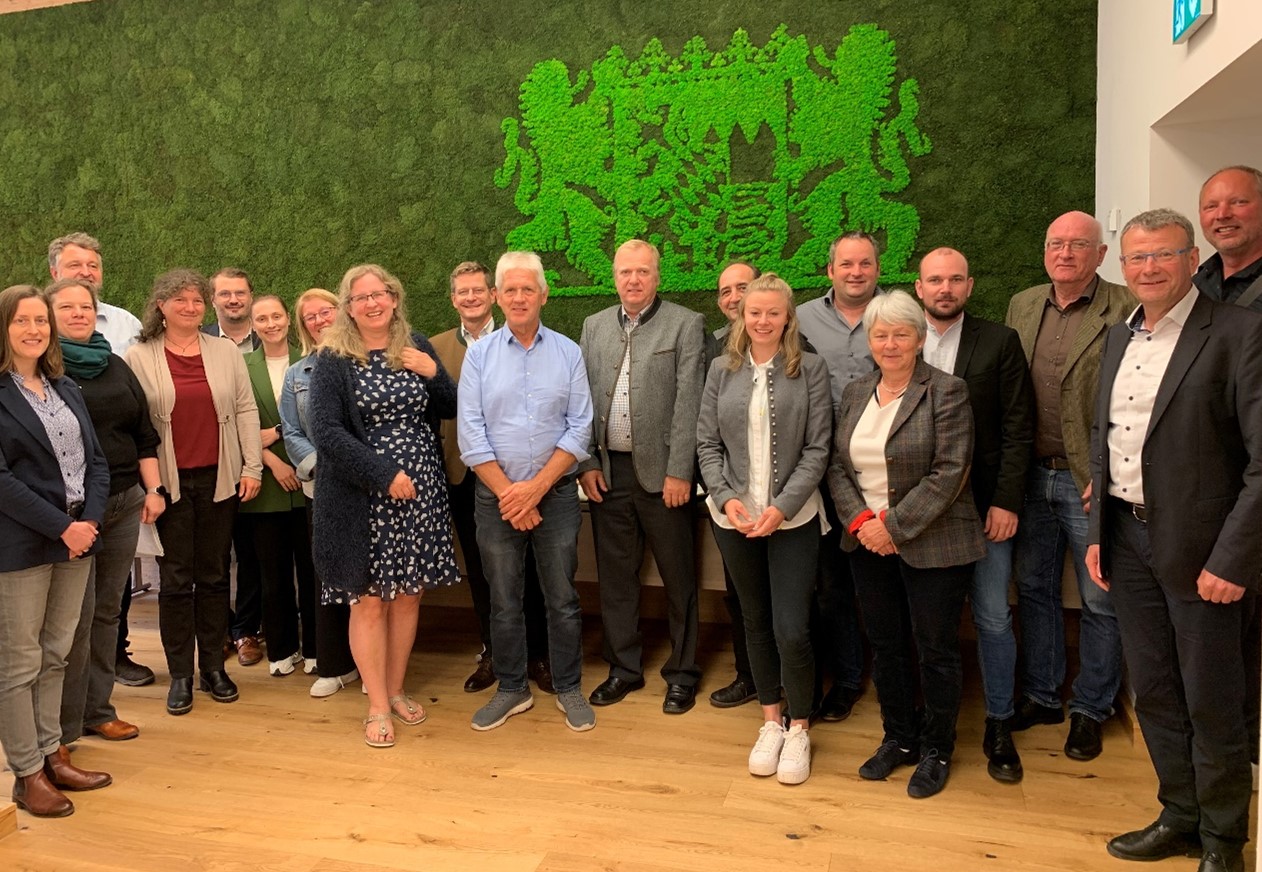Koks iššūkis/problema buvo sprendžiama?
Yra 26000 ožkos Bavarijoje. Jaunų ožkų auginimas mėsos gamybai, ypač vyriškos, nėra nuomojamas. Ožkiena Vokietijoje nėra įprastas patiekalas, tačiau sveikos ir kokybiškos mėsos potencialas yra didelis. Ožkos vaidina svarbų vaidmenį išsaugant kraštovaizdį ir gamtą, nes tai labai plati žemėnauda kartu su ožkų auginimu. Paklausos pusė – prekybos centrai ir restoranai – tikimasi min. 10 kg mėsos gabalo svorio, ko jie paprastai negauna vienodai ir pakankamai dideliais kiekiais iš gamintojo pusės. Didžioji dalis 1700 ožkų augintojai Bavarijoje yra ožkų pieno gamintojai. Mėsa yra šalutinis produktas, dėl mažo gyvūno dydžio reikia palyginti daug pastangų pjaustant skerdenas mėsinėje. Trūksta informacinio ryšio tarp gamintojų ir galutinių vartotojų, kur paklausa ir pasiūla sutampa. Nėra skaidrios informacijos apie ožkienos rinkos kainas.
Kaip išsprendei problemą?
Bavarijos ožkų augintojų asociacija kreipėsi į Žemės ūkio ministeriją, kad padėtų rasti sprendimą dėl neišspręsto iššūkio prekiauti jaunų ožkų mėsa Bavarijoje.. Praeityje buvo keli bandymai išspręsti šią problemą, tačiau akivaizdu, kad nebuvo sėkmingo įgyvendinimo ar veiksmų plano. Birželio mėn 2024, ministerija, kartu su Ožkų augintojų asociacija pakvietė visas suinteresuotas šalis į pradinį seminarą Miunchene. Pagrindinis šio seminaro rezultatas buvo, kad EIP-Agri projekto paraiška, kur pradinė investicija į centrinio ožkų rinkodaros kontaktinio punkto sukūrimą, būtų prasminga. Pirmą kartą atrodo, kad visi svarbūs veikėjai nuo pat pradžių buvo įtraukti į problemų sprendimą.
Kas naujoviška jūsų praktiniu atveju?
Šiuo atveju, ieškome rinkos naujovių. Atotrūkis tarp gamintojų ir paklausos bus panaikintas. Derantis ir abipusiai informuojant, kada ir kiek kokybiškos ožkienos pagaminama atitinkamai reikia, yra sukurtas rinkos informacijos ir tarpininkavimo punktas, užpildyti trūkstamą grandį vertės grandinėje. Rinkodaros kampanija gali būti pradėta iš karto, kai apie tai informuojami gamintojai.
Kokie yra sėkmės veiksniai sprendžiant problemą?
Projektas vis dar yra pradiniame etape, tačiau pagrindiniai sėkmės veiksniai yra visų suinteresuotųjų šalių įtraukimas nuo pat pradžių.
Netikėtos nesėkmės, jei bet kuris
Kol kas, projektas nepatyrė jokių reikšmingų gedimų.
Išmoktos pamokos
- Kadangi projektas dar tik pradiniame etape, reikia imtis tolesnių veiksmų, kad būtų sėkmingas.
- Ožkų augintojai nori auginti ožkų jauniklius mėsai iš aiškios gyvūnų gerovės padėties, net jei nebus padengtos visos išlaidos.
- Parduoti ožkienos mėsą nebus pati sunkiausia dalis. Strategijos seminare buvo sukurta pakankamai idėjų. Ypač gastronomija moka rengti ir realizuoti rinkos projektus. Bavarijos žemės ūkio namų ūkio kolegijos yra pasiruošusios savo edukacinėje programoje populiarinti ožkieną. Netgi būtų rinkodaros klaida pradėti rinkodaros kampaniją, kol dar nėra užtikrinta, kad produktas gali būti pristatytas. Tai reiškia, projektas turi pradėti įtraukti gamintojus, ypač ožkų pieno augintojai.
Kokį vaidmenį praktikoje atlieka patarėjas ar patarėjų tarnyba
Ministerija paprašė FüAk palengvinti pradinį strategijos seminarą. Interaktyvų seminarą sukūrė ir įgyvendino du patyrę treneriai ir fasilitatoriai Pablo Asensio ir Hansas Zimmermannas., užtikrinti, kad visos suinteresuotosios šalys būtų įtrauktos. „Bioland Goat Advisor“ pristatė šiuo metu vykdomo bandomojo projekto ir tyrimo dėl ėrienos ir ožkienos rezultatus. Jis atsinešė kompetencijos ir patirties ir galėjo įvardyti lemiamas kliūtis.
Ar jūsų požiūris gali būti perkeltas ir (arba) pritaikytas kitiems inovacijų iššūkiams ir regionams?
Taip.
Už dalijimąsi patirtimi apie gerą praktiką, susisiekite su Pablo Asensio (paštu: pablo.asensio@fueak.bayern.de telefonas: +49 871 9522 4369)


